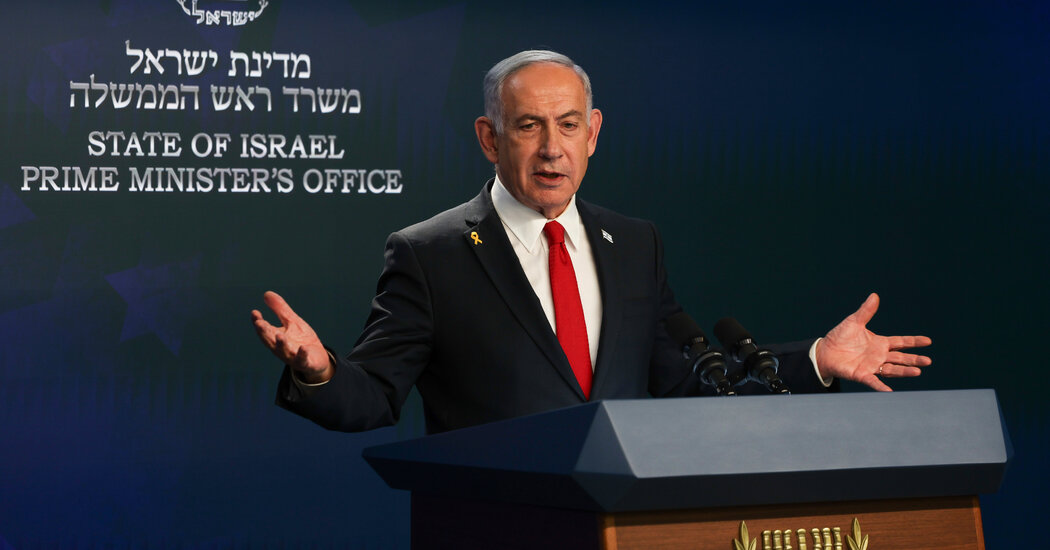Israel’s opposition parties said they would bring a motion to dissolve Parliament to a vote on Wednesday, presenting the most serious challenge yet to Prime Minister Benjamin Netanyahu’s right-wing government and raising the prospect of early elections.
If the motion passes, it is unlikely that the government will fall immediately. The parliamentary process before any final vote could take months, giving the prime minister time to shore up his increasingly fractious governing coalition or create more favorable conditions for himself before a return to the ballot box. But it would deal a heavy blow to his political credibility.
The opposition parties are exploiting a fight within the governing coalition over the contentious, decades-old policy that exempts ultra-Orthodox men who are studying religion in seminaries from compulsory military service.
Mr. Netanyahu’s ultra-Orthodox coalition partners, the United Torah Judaism and Shas parties, have been locked in a dispute with other members of the government over proposals to limit exemptions from military service and enlist many ultra-Orthodox men of draft age into the armed forces. The issue has taken on more urgency, and spurred growing public anger and scrutiny, since the Hamas-led attack on Oct. 7, 2023, ignited Israel’s war in Gaza.
United Torah Judaism has threatened to vote with the opposition, saying that it cannot accept the principle of drafting seminary students. Shas has kept its options open, and in general the threats to quit or dissolve the Knesset have been mostly intended as a tactic to prevent the forced enlistment of seminary students. But if the parties vote with the opposition, it could provide the majority needed to dissolve Parliament.
The ultra-Orthodox have been largely exempt from military service since the establishment of Israel in 1948. Yet the number of full-time religious seminary students has grown from hundreds to tens of thousands in that time.
Israelis have long bristled over a lack of equal treatment in a country where most Jewish 18-year-olds, male and female, are conscripted for years of compulsory military service. The long war in Gaza has added to the anger and underscored the military’s need for more soldiers. A year ago, Israel’s Supreme Court ruled that the mass exemption policy must end.
Mr. Netanyahu’s coalition was formed in 2022 and commands a majority of 68 seats in the 120-seat Knesset. Shas and United Torah Judaism hold 18 seats between them, giving them strong leverage. The next election would take place in October 2026 if it were to reach full term.
The ultra-Orthodox parties are not keen to break up the government, which is the most right-wing and religiously conservative in Israel’s history. Their constituencies have been given a lot of financial support and other privileges, and they would also have little to gain from an early election, as it is unlikely that they would do better in any other coalition or political constellation.
Mr. Netanyahu’s government has become increasingly unpopular since October 2023, with opinion polls indicating that the coalition would not win an election at this time. Many Israelis are outraged at the prime minister’s refusal to take personal responsibility for the intelligence, policy and military failures leading up to the 2023 attack and for not doing enough to return the hostages who were taken that day and remain in Gaza.
But Mr. Netanyahu, Israel’s longest serving prime minister and a political survivor, has endured many government crises during his previous terms in office.
As the parliamentary session got underway on Wednesday, Mr. Netanyahu’s allies were engaged in negotiations with the ultra-Orthodox politicians to help delay the dissolution vote by a week, or to reach a compromise on enlisting religious students that would resolve the coalition crisis altogether.
In the assembly, Mr. Netanyahu’s allies promoted other bills and made long speeches in an apparent effort to play for time. That meant that the vote for dissolving the Knesset would most likely take place late on Wednesday night, if at all.
But the split inside the coalition has given the main opposition parties — a diverse collection of left-wing, centrist and right-leaning factions — a political opportunity to challenge the government. The parliamentary opposition has long struggled to coalesce around a common agenda beyond a shared antipathy to Mr. Netanyahu and his ruling coalition. While its main parties support the move to enlist ultra-Orthodox religious students, they say their priority is to bring down the government and force new elections.
If the motion is passed, the bill would need to go to a parliamentary committee for review before returning to the assembly for further votes, and Mr. Netanyahu and his political allies could stall that process for months.
But analysts say that even preliminary approval to dissolve Parliament could further destabilize Mr. Netanyahu’s government.
“The whole system would go into a different mode — election mode,” said Aviv Bushinsky, a political analyst and a former media adviser to Mr. Netanyahu. Losing a vote would indicate a lack of leadership on Mr. Netanyahu’s part, he added, and an inability to control his coalition.
Johnatan Reiss and Gabby Sobelman contributed reporting.











